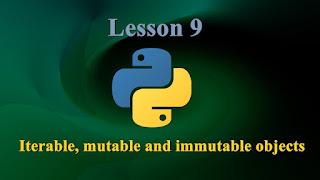In previous lessons we've talked about strings, strings methods,
lists and lists methods, there, we've said strings are immutable objects and lists are mutable objects and both of them are iterables but the question is what's an iterable, mutable and an immutable object? And what's the difference between mutable and immutable objects? In this post we will discuss all of this.
As said in the first lesson, any object has three important properties which are a name, value and type. An object is mutable or immutable depends on its ability to change its value without changing its position in the memory. By the built-in function id(), Python provides the ability to check out an object id in the memory.
Simply, an object is immutable if it can't change its value without changing its id
Examples:
As said in the first lesson, any object has three important properties which are a name, value and type. An object is mutable or immutable depends on its ability to change its value without changing its position in the memory. By the built-in function id(), Python provides the ability to check out an object id in the memory.
Simply, an object is immutable if it can't change its value without changing its id
Examples:
>>> string='Python'
if we try to change string's value we will get an error.
>>> string[0]='J'
Traceback (most recent call last):
File "", line 1, in
string[0]='J'
TypeError: 'str' object does not support item assignment
File "
string[0]='J'
TypeError: 'str' object does not support item assignment
Even if we assign string's value to another variable the new one will be the same
just it will consider as another name of string
Example:
>>> string2 = string
>>> string2 is string
True
True
The is statement returns True if two variables have the same identity, otherwise False.
>>> id(string) == id(string2)
True
>>> string2
'ython'
>>> string is string2
False
>>> string2 ='J' +string2
>>> string2
'Jython'
>>> string2 is string
False
Here the string2 is different.
Briefly, an immutable object can't change its value and keeps its identity.
The built-in immutable types in Python are str, int, float, tuple, bool and set.
The mutable is opposite, it can change its value and keeps its identity. An example of mutable is list.
>>> mylist=['P','y','t','h','o','n']
>>> id(mylist)
3053712204
>>> identity=id(mylist)
>>> mylist[0]='J'
>>> mylist
['J', 'y', 't', 'h', 'o', 'n']
>>> identity == id(mylist)
True
As we can see, when we tried to modify the first item of string we got an error unlike mylist that's been done successfully.
The buit-in mutable types in Python are list, dictionary.
Briefly, a mutable can change its value and keeps its identity.
Now, let's turn to iterable objects.
Simply, an iterable is an object ca return its members one by one, in other words, we can loop through it by using for or while loops.
>>> mylist=['P','y','t','h','o','n']
>>> for i in mylist:
print(i)
P
y
t
h
o
n
The iterable built-in types in Python are string, list, tuple, set, dictionary, and generators, some of these types have already been discussed and others will be later.








No comments:
Post a Comment